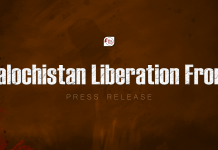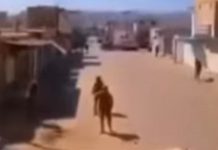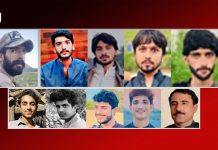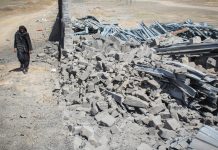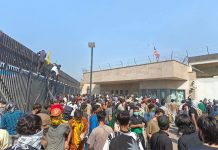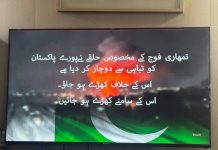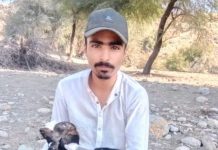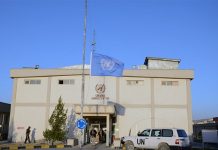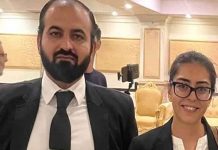Will dialogue take place between Pakistan and Baloch insurgents? — TBP Report
Author: Zaarain Baloch
“Only the Baloch sarmachars will decide if they want to hold dialogue or not, not the oppressive Pakistani state,” insurgent leader, Bashir Zeb said in response to the Pakistani Premier’s statement of ‘considering dialogues with insurgents’.
Pakistani Prime Minister Imran Khan said in his one-day visit to Gwadar on Monday that his government is considering negotiations with the Baloch insurgent groups. PM addressed a group of students, local elders and business leaders in Gwadar during his one-day visit.
Khan said that he had always thought that when the PTI came to power, the government would pay attention to Balochistan because the stability of Balochistan is deeply intertwined with the peace of Pakistan. He said that once the ‘province’ progressed, the people of Balochistan will consider Pakistan as theirs. He claimed to have given the biggest package to Balochistan this year because “we believe that justice has indeed not been done with the people of Balochistan; they have been left behind,” he added.
He said that neither the centre did justice to Balochistan nor its own politicians: the developmental funds apportioned for the upbringing of Balochistan were spent by the politicians on themselves. “The sense of deprivation that started spreading in Balochistan, it would never have spread if the politicians in Balochistan had spent money in the right way,” PM Khan said.
What Pakistan’s current Prime Minister said in his statement on Monday, are not unheard words to the people of Balochistan said by almost every ruler of Pakistan. Nevertheless, the fate of Baloch people doesn’t change, neither the curse of war lifted over the Baloch land.
While acknowledging the importance of Balochistan and the peace in it, the Pakistan’s Army Chief General Qamar Javed Bajwa said in a gathering on Tuesday that: “Balochistan’s peace and prosperity is the bedrock of Pakistan’s progress.” He made the remarks at the 7th National Workshop Balochistan held in the GHQ in Rawalpindi.
Pakistani Federal Minister Fawad Chaudhary also made similar remarks at a press conference in Islamabad on Tuesday. He said that the government has started to work on a plan to initiate with the “aggrieved people” of Balochistan, and nationalists who “were not directly linked to India.” He clarified that the criteria for those “directly linked to India” or were involved in ‘terrorist activities would be different.
PTI’s promises
Political reconciliation with disgruntled Baloch leadership was a primary focus of the PTI’s election manifesto. Imran Khan promised that after coming into power, he would extend a friendly hand towards the Baloch “pro-independence” groups in an effort to alleviate their grievances and assimilate them into the Pakistani society as equal citizens.
Three years later, the PTI is yet to reach out to the Baloch insurgents.
Analysts argue that there are two main reasons the PTI has failed in its most important pledge vis-à-vis Balochistan: the military establishment and the ruling Balochistan Awami Party (BAP), headed by the incumbent Chief Minister of Balochistan Jam Kamal Khan.
These two key players are not in favour of reconciliation with the Baloch insurgents. Outreach efforts can’t make headway without the support of the military establishment, which is mooching out billions of rupees to counter the insurgency. Any step towards a peaceful reconciliation will halt this funding, a bargain that the military establishment is loath to strike.
Experts say that what the military does not understand is that it cannot counter the insurgency with brute forces. Despite the crushing crackdowns, enforced disappearances, kill-and-dumps and numerous other “gangster tactics”, the military has so far failed to even extenuate the insurgency, let alone crushing it all together. If anything, the insurgents have grown more powerful and sophisticated – they have ventured beyond the border of Balochistan to strike the highly-guarded key Pakistani and Chinese government facilities in Karachi.
The second player, BAP, has never been sympathetic to the idea of political reconciliation. Launched and raised to power by Pakistan’s military establishment, BAP comprises politicians who are loyal to the military. Most of them are beneficiaries of the ongoing conflict in Balochistan and, therefore, have a stake in its continuity. Some of them fear losing their careers if a peace agreement is set up with the Baloch “pro-independence” groups.
Why now?
In the past, offers of reconciliation between the Pakistani state and Baloch insurgents have taken place in the backdrop of the situation in Afghanistan. Past governments, in last 2 decades since the current insurgency, have made similar efforts, but what makes this one stand out is the timing.
Many argue that with the United States pulling out of Afghanistan, efforts are being made to reset the political atmosphere in Balochistan. Afghanistan once offered a safe sanctuary to the Baloch insurgent leaders, and quite a few – like Balaach Marri and Aslam Baloch – breathed their last on the Afghan soil. But with the Taliban now gaining power in post-US Afghanistan and Pakistan still having a considerable influence over them, Afghanistan might no longer be a safe sanctuary for the Baloch insurgents.
“This can be a great opportunity to reset the situation only if Prime Minister Khan enjoys the support of the Army and also the backing of the Chinese”, Malik Siraj Akbar, a Baloch journalist based in Washington, told The Balochistan Post.
Akbar argues that the prospects of political reconciliation in Balochistan are further marred by the lack of organized leadership among the Baloch insurgents. “With influential figures like the late Nawab Khair Baksh Marri dead, there is no single Baloch figure who has the capability to influence most (if not all) of the Balochs to rally on a single call.” Approaching any single armed group would amount to “divide and rule.”
Akbar argues that the current situation in Balochistan is not conducive for the insurgents to strike a deal with the Pakistani authorities. He says that the insurgents understand the difficulty of their situation – they know that showing any concessions to Pakistan would amount to ending their movement altogether. “Their interests lie in completely rejecting such offers.”
‘Expulsion of Pakistani forces and independence of Balochistan’
The Balochistan Post reached out to the Baloch “pro-independence” leaders to get their point of view on the current developments. All the major insurgent groups say that dialogue can only occur if the Pakistani state is compliant with their demands of an independent Balochistan and a complete military withdrawal from the Baloch soil.
Basheer Zeb Baloch, head of the Baloch Liberation Army, told The Balochistan Post that Imran Khan, who has become the Prime Minister by sitting on the shoulders of which institutions, is now hinting at talks directed by the same institutions after numerous successful attacks on the CPEC projects by the Baloch insurgents. “The pro-independence fighters don’t care whether Imran Khan considers negotiations or not —only the Baloch sarmachars will decide if they want to hold dialogue or not, not the oppressive Pakistani state,” he said.
The BLA chief said that the moment we picked up arms, we put forward our conditions for a political settlement: the independence of Balochistan and the complete expulsion of the Pakistani troops from the Baloch soil, to reduce the loss of human lives. If Pakistani authorities are amenable to these conditions, we are ready for dialogue in the presence of an international mediator.
Another veteran insurgent and a prominent leader of the Balochistan Liberation Front, Dr. Allah Nazar Baloch also echoed similar sentiments. He told The Balochistan Post that Pakistan is a ” perverse, irresponsible and an untrustworthy” state.
“We are ready for a dialogue in the presence of the UNO, but only if the Pakistani state is compliant on our demand for an independent Balochistan and agrees to pull out its military from the Baloch land”, the BLF chief said. “Otherwise the considerations for negotiations are simply preposterous.”
Dr. Allah Nazar Baloch said that through negotiations, the Pakistani state is now trying to mask its rampant human rights abuses in Balochistan, like enforced disappearances and kill-and-dumps. “But the world is not so blind to ignore its atrocities”, he said.
Gulzar Imam Baloch, the leader of the Baloch Republican Army, told The Balochistan Post that: “The Baloch insurgents are struggling for the independence of Balochistan from the Pakistani state. We are ready for negotiations brokered by a neutral third party, but only if the Pakistani authorities are acquiescent to our demand of a sovereign, independent Balochistan.”
Promises have been made by Pakistan in the past as well, but the people of Balochistan have witnessed the state reneging its promises again and again. That leaves Baloch people in a war and deprived of all basic facilities of life. On the other hand, Baloch insurgents are unshakable on independence demand, which is not acceptable for Pakistan. Hence, the negotiations don’t seem happening until a third-party intervenes.













